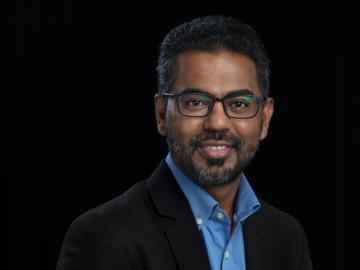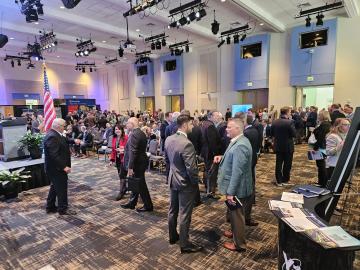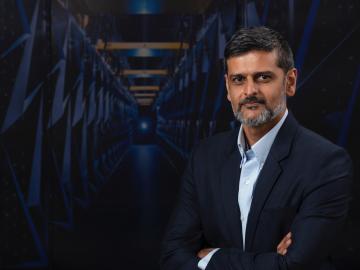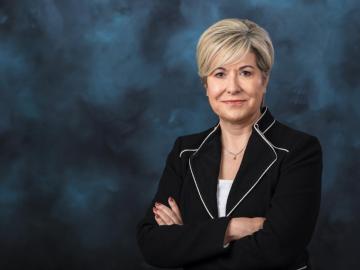
Filter News
Area of Research
- Advanced Manufacturing (1)
- Biology and Environment (6)
- Computer Science (2)
- Electricity and Smart Grid (1)
- Energy Science (21)
- Functional Materials for Energy (1)
- Fusion and Fission (4)
- Fusion Energy (1)
- Materials (21)
- Materials for Computing (1)
- National Security (8)
- Neutron Science (3)
- Nuclear Science and Technology (3)
- Supercomputing (21)
News Type
News Topics
- (-) Advanced Reactors (14)
- (-) Artificial Intelligence (46)
- (-) Clean Water (2)
- (-) Grid (21)
- (-) Microscopy (20)
- (-) Molten Salt (3)
- 3-D Printing/Advanced Manufacturing (59)
- Big Data (17)
- Bioenergy (29)
- Biology (30)
- Biomedical (21)
- Biotechnology (12)
- Buildings (22)
- Chemical Sciences (44)
- Composites (14)
- Computer Science (79)
- Coronavirus (17)
- Critical Materials (11)
- Cybersecurity (18)
- Education (3)
- Element Discovery (1)
- Emergency (1)
- Energy Storage (48)
- Environment (51)
- Exascale Computing (23)
- Fossil Energy (1)
- Frontier (24)
- Fusion (19)
- High-Performance Computing (46)
- Irradiation (1)
- Isotopes (24)
- ITER (3)
- Machine Learning (17)
- Materials (71)
- Materials Science (60)
- Mercury (2)
- Microelectronics (1)
- Nanotechnology (32)
- National Security (23)
- Neutron Science (61)
- Nuclear Energy (36)
- Partnerships (34)
- Physics (27)
- Polymers (14)
- Quantum Computing (16)
- Quantum Science (35)
- Security (12)
- Simulation (15)
- Software (1)
- Space Exploration (3)
- Statistics (1)
- Summit (24)
- Transportation (37)
Media Contacts

Prasanna Balaprakash, director of AI programs at the Department of Energy’s Oak Ridge National Laboratory, has been appointed to Tennessee’s Artificial Intelligence Advisory Council.
The contract will be awarded to develop the newest high-performance computing system at the Oak Ridge Leadership Computing Facility.

To better predict long-term flooding risk, scientists at the Department of Energy’s Oak Ridge National Laboratory developed a 3D modeling framework that captures the complex dynamics of water as it flows across the landscape. The framework seeks to provide valuable insights into which communities are most vulnerable as the climate changes, and was developed for a project that’s assessing climate risk and mitigation pathways for an urban area along the Southeast Texas coast.

Phani Ratna Vanamali Marthi, an R&D associate in the Power Systems Resilience group at ORNL, has been elevated to the grade of senior member of the Institute of Electrical and Electronics Engineers, the world’s largest technical professional

Vanderbilt University and ORNL announced a partnership to develop training, testing and evaluation methods that will accelerate the Department of Defense’s adoption of AI-based systems in operational environments.

Researchers at ORNL are developing battery technologies to fight climate change in two ways, by expanding the use of renewable energy and capturing airborne carbon dioxide.

Scientists at ORNL completed a study of how well vegetation survived extreme heat events in both urban and rural communities across the country in recent years. The analysis informs pathways for climate mitigation, including ways to reduce the effect of urban heat islands.

In partnership with the National Cancer Institute, researchers from ORNL and Louisiana State University developed a long-sequenced AI transformer capable of processing millions of pathology reports to provide experts researching cancer diagnoses and management with exponentially more accurate information on cancer reporting.

Anuj J. Kapadia, who heads the Advanced Computing Methods for Health Sciences Section at ORNL, has been elected as president of the Southeastern Chapter of the American Association of Physicists in Medicine.

Gina Tourassi, associate laboratory director for computing and computational sciences at the US Department of Energy’s (DOE’s) Oak Ridge National Laboratory, has been named a fellow of the Institute of Electrical and Electronics Engineers, the world’s largest organization for technical professionals.


